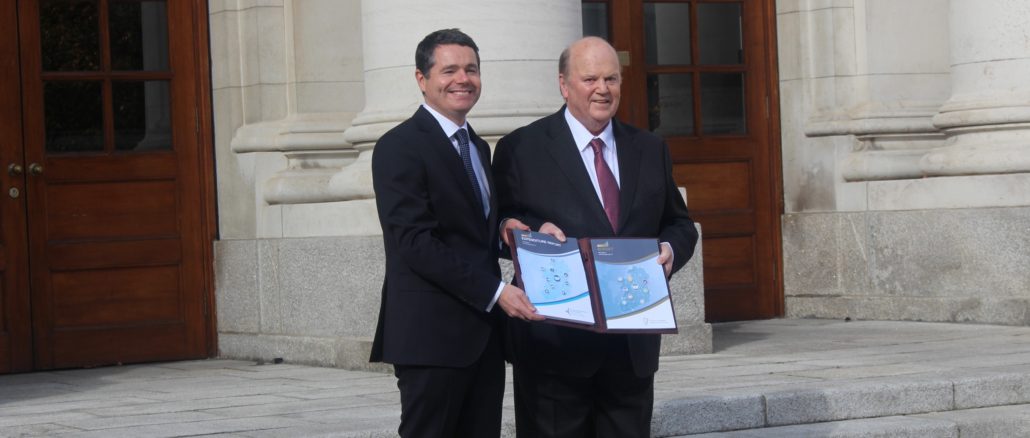
[dropcap]The [/dropcap]details of the budget package for 2017 were announced by Minister for Finance Michael Noonan and Minister for Public Expenditure Paschal Donohoe in the Dáil this week.
Education:
The Government announced that €36.5 million will be allocated to third level education and further education in the coming year. People choosing to re-enter education will also benefit from a new €500 annual allowance, set aside under social protection measures.
While over 16 per cent of the total budget is being allocated to the education sector, the Union of Students in Ireland (USI) said that the funding for higher education remains insufficient. The USI recommended that €140 million be set aside for the sector in order to reduce registration fees and increase student support.
A total of €4 million was allocated to postgraduate grants, a measure welcomed by the USI, though it will only directly benefit approximately 1,100 people from disadvantaged socioeconomic backgrounds. They are calling for further investment in the area.
The Union said there are universal benefits to having a publicly funded education system as it feeds into employment, health, science, technology and the economy.
“Any investment in education is something USI welcomes and the small steps in Budget 17 are in the right direction but are hugely insufficient in the long-term.” Annie Hoey, USI President, said.
“The government failing to prioritise adequate funding for third level education is the government putting barriers to the futures and potential of thousands of students. There are some positives in the Budget but the funding is still inadequate and won’t solve the rotating problems currently in third level education, which are largely funding-based.”
Similar sentiments were echoed by DCU President Prof. Brian MacCraith earlier in the year, who said an additional €100 million needed to be invested, following a 30 per cent drop in investment over the past seven years.
MacCraith also advised that the Government should consider introducing an income contingent loan scheme. Though the idea has been mentioned by Government in the past few months, today’s Budget shed no further light on the proposal.
In protest of a loan scheme the USI will stage a national demonstration on October 19, which will be supported by almost 2 million members from various national trade unions.
Tax cuts:
Mr. Noonan announced a large range of tax cuts within his Budget speech; equating to €500 million in total. Mr. Noonan stated that the total budget adjustment for 2017 will be €1.3 billion, weighing in at about 3:1 between spending increases and taxation cuts.
Rainy day fund
A rainy day fund of €1 billion a year will be put aside from 2018. “The Government will set aside an amount of up to €1 billion annually to this fund to be deployed by the Government of the day, in a countercyclical manner,” Mr. Noonan announced.
Help to buy scheme
A “Help-To-Buy” scheme for first time buyers was announced by Mr. Noonan during his speech today. It is set to provide a 5 per cent PAYE rebate of up to €20,000 over four years on new home property that is worth up to €400,000.
“Second hand properties are not included in the Help-to-Buy measure, but I am extending the Home Renovation Incentive Scheme by two years to the end of 2018,” Mr. Noonan stated.
Welfare payments
The state pension will rise by €5 per week in March. The carer’s allowance, disability allowance and jobseeker’s benefit are also set to rise by €5 each per week.
“Carers, the unemployed, and those living with disabilities may not always have the loudest voices, but their needs are no less real,” Mr. Donohoe stated in his speech.
A payment of an 85 per cent Christmas bonus for Social Welfare recipients was also announced.
Cigarettes:
The only tax increase is the price of cigarettes that are due to increase by 50c, making the price of an average 20 pack about €11. For the past five years, cigarette duties have increased with the passing of the annual budget.
There will also be proportional taxes on other tobacco products such as rolling tobacco.
Minimum wage:
Minimum wage is set to increase by 10c up to €9.25 an hour. Fine Gael and the Independents talked earlier in the year about raising minimum wage to €10.50, but were recommended the 10c increase by the Low Pay Commission and accepted.
Labour senator and spokesman on Labour Affairs and Workers Rights Ged Nash said, “a solemn promise was made by Fine Gael and the Independents that the minimum wage would lift to €10.50 during the term of this Government.”
Nash predicts it will take almost 13 years to reach the target the administration previously set itself last May in the Programme for Government.
USC:
The Minister of Finance has reduced the three lowest brackets of the Universal Social Charge. The 5.5 per cent rate has been reduced to 5 per cent, the 3 per cent to 2.5 per cent and the 1 per cent to .5 per cent. For someone working a 40-hour week and making minimum wage, this saves an extra €4 weekly, and an extra €2 weekly for students working part-time, 20 hours a week.
Rebecca Lumley, Hayley Halpin & Kyle Ewald
Image Credit: Rebecca Lumley




Leave a Reply